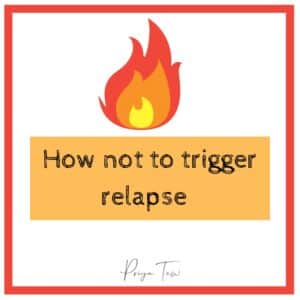How to not trigger relapse.
Firstly, whilst a relapse is not nice, it can be a normal part of recovery from an eating disorder and it is good to normalise that. It does not mean you have done anything wrong in your recovery, instead see it as a chance to learn more about how to help you become your strongest self. If or even, when relapse happens, the key is to get back on track with your eating and recovery plan as soon as you can. Reflect on what the trigger was and think about what would have helped prevene the relapse. Reflection is such an important key. You can do this in a therapy session, with your dietitan, with a family member, in your journal or through another creative expression.
If you are not an eating disorder specialist and come across someone with an eating disorder it is helpful to know what can be triggering and ways to express information in a helpful way. This often means changing your language and altering the usual health messages that you give out.
If you have an eating disorder then I hope this post may be helpful for you to share with any health care professionals that you see. It has been written after some clients I have worked with have had less than helpful messages form their health care team that triggered a relapse.
Having an eating disorder is not something that someone chooses to have. They can be triggered by a variety of events, including trauma, genetic predisposition, extreme diets, stressful periods of life, loss, sickness, messages from society and those around. The words we give out and the messages used are therefore key.
Much like you would alter your phrases, words and messages for someone who has suffered a traumatic event, so this is key for someone in recovery from an eating disorder.
Some messages that are not helpful:
- Snacks are not needed, stick to 3 meals a day.
In eating disorder recovery 3 meals plus snacks are important for helping the body find a routine and to stabilise eating.
Instead try:
“Regular eating is important, for some this is 3 meals a day, for others this includes snacks”
- Stay away from sugary foods, they are bad for your health/teeth.
Sugary foods can provide a necessary source of energy in recovery and whilst there can be other foods to provide this, it is so important to not demonise a nutrient or food, so there are no fear foods.
Instead try:
“All foods can be part of a healthy, balanced diet”
- Move your body more.
Whilst this is a useful phrase for some people, in some stages of recovery it is important to move less and to allow the body to rest. The type of movement may need to become lower impact or the length of time exercising may need to reduce. By saying we all need to move our bodies for a certain number of minutes or in a certain way this can lead to guilt, shame or even competition.
Instead try:
“Our bodies need rest and movement and this alters throughout our lifetime, we all have differing needs.”
- Talking about calories.
It can be very triggering to mention calories, macros or to encourage the tracking of this. This is often a behaviour that people in recovery are working on stopping. By bringing attention to calories or encouraging apps that track these it can increase the obsessive nature of tracking, counting and weighing.
Instead try:
“Food contains so many wonderful nutrients and our bodies need diversity”
- Comments on weight and shape
Another triggering area. Whether this is a comment on your own weight and shape, or on someone else’s it is not helpful. Try to stay neutral in your comments about bodies and focus another attributes.
Instead try:
“Bodies come in all shapes and sizes and are amazing, I really love this part of your character (eg: your sense of humour, kindness, generous spirit”
- Wow, you have done well to recover.
You cannot assume someone is doing well in their recovery because they look a healthy weight. People suffering from an eating disorder can be all shapes and sizes. In the same way that you cannot tell someones healthy by looking at them from the outside, you cannot tell how someone is doing in their recovery journey just by looking at them.
Instead try:
“How are you doing in your recovery, can I help in any way?”
If you are suffering from a relapse and need some support getting back on track, please do get in touch, speak to your mental health team or check out these resources here and here.
